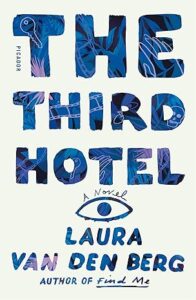(Reviewed by JD Jung)
“The foundation of horror is a dislocation of reality, a dislocation designed to reveal the reality that has been there all along, and such dislocations happen all the time. “
That was according to the fictional Yuniel Mata, director of Revolución Zombi , the first horror movie ever made in Cuba.
And this was to apply to recently widowed Clare, who “had allowed her reality to become so dislocated…”
She decided to travel to Cuba to attend the annual Festival of New Latin American Cinema in place of her husband Richard, a film studies professor who specialized in the horror genre. Richard had been secretive the last year of his life, so she wanted to do the same in her own way. She proceeded to delve into different identities in Havana, a city where no one knew her.
The problem was that her dislocated reality surfaced when she checked into “The Third Hotel”, where she thought saw Richard and continually stalked him or someone like him . “She believed that if she and Richard kept following their private plans together, in parallel, these separate plans might align, merge into one.” Richard would respond that the grieving are deranged.
This story is not just about an unstable, grief-stricken widow, though. The Third Hotel takes us on a surreal fling through Havana with a multitude of fascinating characters and situations, from the professor holding class with no students to the ostrich that escaped from the zoo. The vivid, colorful prose adds to the experience.
I also relished the jaunt through the horror genre, and how the director is able to manipulate the viewer into a state of terror.
Though I thoroughly enjoyed The Third Hotel, it isn’t for everyone. I have to admit that I wasn’t sure what was real or fantasy. I guess that’s up for discussion and this is the perfect book for that.


